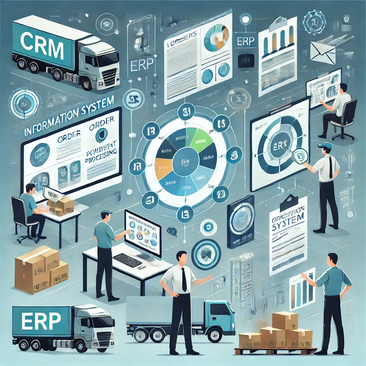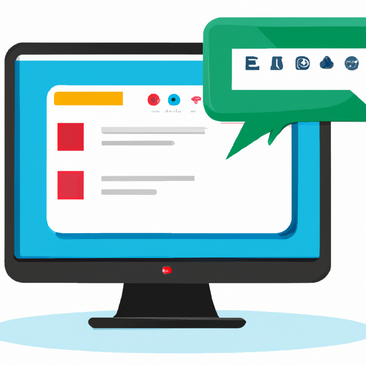Domain Description
Customer and Sales Management encompasses a wide range of technologies, tools, and processes designed to help businesses manage their interactions with customers, automate sales processes, and improve overall customer satisfaction. This domain is critical for businesses of all sizes, as it directly influences revenue growth, customer retention, and operational efficiency. With the advent of Customer Relationship Management (CRM) systems and Sales Automation tools, businesses can now streamline their sales cycles, better understand customer needs, and provide personalized services.
This domain also covers areas such as client prospecting, where companies identify and pursue potential new customers, and marketing strategies aimed at increasing visibility and engagement. Additionally, support services play a crucial role in maintaining strong customer relationships, while loyalty systems ensure long-term customer retention by rewarding repeat business.
What the Domain Includes
The Customer and Sales domain includes several key components, each contributing to the overall success of customer acquisition, sales generation, and retention:
- Customer Relationship Management (CRM): CRM systems, such as Salesforce, HubSpot, or Zoho CRM, help businesses store and manage customer data, track interactions, and manage customer relationships. CRM tools provide a centralized database for sales teams, allowing them to access customer information, track sales opportunities, and follow up on leads. CRM systems also help in segmenting customers based on their purchasing history, preferences, and engagement, enabling more targeted and effective communication.
- Sales Automation: Sales automation tools streamline repetitive tasks such as sending follow-up emails, updating CRM records, and scheduling meetings. Tools like Pipedrive, Salesloft, or Outreach.io enable sales teams to focus on high-value activities, such as closing deals, while the automation software handles administrative tasks. Sales automation improves productivity, shortens sales cycles, and ensures that no lead or opportunity is missed.
- Support Services: Providing excellent customer support is essential for maintaining customer satisfaction and loyalty. Businesses utilize helpdesk and ticketing systems, such as Zendesk or Freshdesk, to manage customer inquiries and provide real-time assistance. These platforms offer multi-channel support, allowing customers to reach out via email, chat, or social media, and ensure that customer issues are resolved efficiently.
- Marketing: Effective marketing strategies are crucial to attracting new customers and retaining existing ones. Marketing automation tools like Marketo, Mailchimp, or ActiveCampaign help businesses automate email campaigns, track customer engagement, and measure marketing performance. Marketing tools also assist in lead generation by nurturing prospects through targeted content, personalized messaging, and inbound marketing strategies.
- Client Prospecting: Client prospecting tools, such as LinkedIn Sales Navigator, ZoomInfo, or Hunter.io, assist businesses in identifying and engaging potential clients. These tools provide detailed information about prospects, including company details, decision-makers, and industry trends, enabling sales teams to craft more personalized outreach strategies and increase their chances of conversion.
- Loyalty Systems: Loyalty programs are designed to reward customers for repeat business and encourage long-term engagement. Software solutions like LoyaltyLion, Yotpo, or Smile.io allow businesses to create custom loyalty programs, track customer rewards, and offer incentives such as discounts, points, or exclusive access. Loyalty systems not only help retain customers but also increase brand advocacy as satisfied customers are more likely to refer others.
Common Software Solutions in This Domain
Customer and sales management involves various software solutions that integrate seamlessly to support each stage of the customer lifecycle, from acquisition to retention:
- CRM Systems: Platforms like Salesforce, HubSpot, and Zoho CRM provide all-in-one solutions for managing customer interactions, tracking sales pipelines, and monitoring sales team performance. These CRM systems can also integrate with marketing automation tools, support systems, and other business applications to provide a holistic view of customer engagement.
- Sales Automation Tools: Solutions such as Pipedrive, Salesloft, and Outreach.io automate repetitive sales tasks like data entry, email follow-ups, and lead nurturing. By automating these processes, sales teams can focus on closing deals and improving customer relationships. These tools often come with analytics features that help sales managers track performance and optimize their strategies.
- Helpdesk and Support Systems: Tools like Zendesk, Freshdesk, and Intercom enable businesses to provide customer support through various channels, including email, chat, and social media. These platforms offer ticketing systems, knowledge bases, and reporting tools to ensure customer queries are resolved efficiently and customer satisfaction is maintained.
- Marketing Automation Platforms: Marketing platforms such as Mailchimp, Marketo, and ActiveCampaign help businesses automate email marketing campaigns, manage customer lists, and track campaign performance. These tools often include features for lead nurturing, segmentation, and A/B testing, enabling marketers to fine-tune their strategies for better results.
- Client Prospecting Tools: Services like LinkedIn Sales Navigator, ZoomInfo, and Hunter.io provide sales teams with detailed insights into potential clients. These tools offer data on prospects, including contact information, company details, and industry trends, making it easier for sales teams to personalize their outreach and increase their chances of success.
- Loyalty Program Software: Loyalty solutions like LoyaltyLion, Smile.io, and Yotpo allow businesses to create custom loyalty programs that reward repeat customers. These platforms offer features such as points-based rewards, VIP programs, and referral tracking, helping businesses retain customers and encourage brand loyalty.
Challenges in the Domain
While customer and sales management offers many opportunities for businesses to improve operations and revenue, it also presents several challenges:
- Data Management: One of the biggest challenges in this domain is managing vast amounts of customer data. CRM systems need to be properly configured and maintained to ensure that customer data is accurate, up-to-date, and accessible. Data silos and inconsistencies can lead to missed opportunities and a poor customer experience.
- Sales and Marketing Alignment: Ensuring that sales and marketing teams work together effectively can be a challenge. Marketing teams focus on generating leads, while sales teams work on closing deals. Misalignment between these teams can lead to wasted resources and lower conversion rates. Integrating CRM systems with marketing automation platforms can help bridge this gap.
- Automation Fatigue: While automation tools can significantly improve efficiency, over-reliance on automation can lead to impersonal communication and reduced engagement with customers. Businesses must strike a balance between automating routine tasks and maintaining personalized interactions with clients.
- Customer Retention: Retaining customers in a competitive market can be difficult. While loyalty programs are designed to encourage repeat business, they need to be well-executed and offer genuine value to customers. Poorly designed programs may fail to engage customers or lead to low participation rates.
- Personalization: Today’s customers expect personalized experiences, from marketing messages to customer support interactions. However, delivering personalization at scale requires sophisticated tools and strategies. Businesses need to leverage data effectively to provide tailored experiences without crossing privacy boundaries.
- Compliance and Data Security: Managing customer data involves strict compliance with regulations such as GDPR, CCPA, and HIPAA. CRM systems must ensure that customer information is handled securely and that businesses comply with data protection laws to avoid penalties and maintain customer trust.
Conclusion
Customer and sales management is at the heart of business success, enabling companies to acquire, engage, and retain customers more effectively. By utilizing CRM systems, sales automation tools, and support services, businesses can streamline their operations, improve customer experiences, and drive revenue growth. The integration of marketing automation, client prospecting, and loyalty systems ensures that businesses can manage the entire customer lifecycle, from lead generation to long-term loyalty. As businesses continue to evolve in a competitive landscape, the importance of robust customer and sales management systems will only grow, offering new ways to engage and retain customers.















